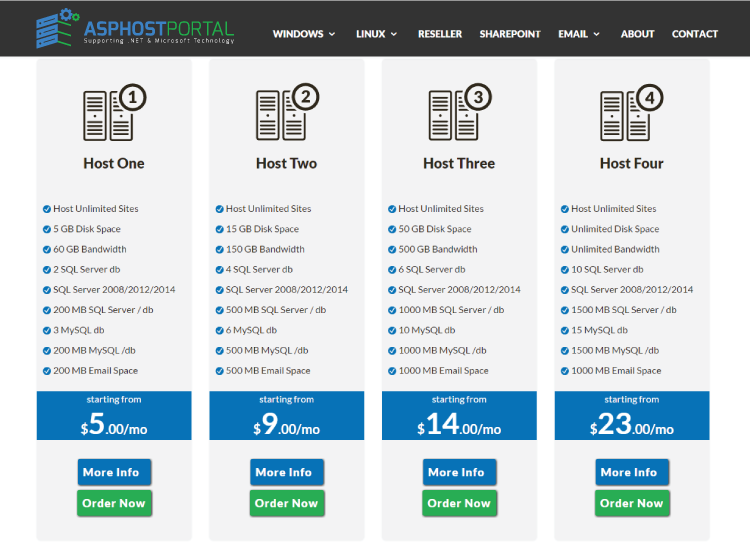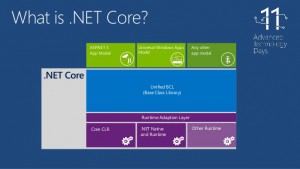Best ASP.NET Core 1.0 Hosting
In internet world, one of the largest sources of problems is often the chosen web hosting, especially if you will create ASP.NET website. Choosing the right ASP.NET hosting provider for your online business is one of the most important decisions you must make because it’s something you can decide you have growth in the short and medium term.
On the contrary, having a bad hosting provider can quickly become a nightmare, and migrate your content to another place is not easy. So let’s take a look at everything you should know to get a good ASP.NET hosting provider, and give a push to your project. Recently, Microsoft announced ASP.NET 5 has been renamed to ASP.NET Core 1.0. The following are our top ASP.NET Core 1.0 hosting provider that I recommend to you.
Top ASP.NET Core 1.0 Hosting Provider
ASPHostPortal.com is ASP.NET hosting provider that has been around for a while now, but each year, the owners strive to bring more cost effectiveness and functionality to the lives of their users. ASPHostPortal.com understands that figuring everything out on your own when first starting your site can be difficult. There may not necessarily be any technical issues involved, but there might be a learning curve that you have to meet before you can expect to use the service’s features with confidence. Click below image to view their ASP.NET Core 1.0 hosting plan.

ASPHostPortal servers are backed with a great internet association and are using the most recent hardware technologies. Their servers are powered by 100p.c wind energy, and use low voltage processors and hardware to cut back the carbon emission and Global Warming effect. The network is monitored 24/7. If you having problems together with your account or want help fitting your web site? Their technicians will facilitate your when you wish it and with what you need.
About ASP.NET Core 1.0
News from Microsoft official website – Two weeks ago, the ASP.NET team announced during the weekly ASP.NET Community Standup and on our blogs it was decided to rename ASP.NET 5 to ASP.NET Core 1.0. This announcement generated great questions that I’ll answer in this post. I’ll also update you on our progress with the ASP.NET Core and .NET Core releases.
Why Do I Still See ASP.NET 5 in Various Official Places?
In the interest of transparency, we decided to disclose the name change before the changes were committed to GitHub. We didn’t want to surprise everyone with a flood of renames and changes to projects and documentation. Now that we are doing development in the open on the framework, tools, and documentation, you can see these changes in our code as we make them. We wanted to make a public statement about this change to ensure that you – our technical community – were all aware of the change at the same time, before code and documents started changing.
The current version that is available to download from NuGet and is compatible with Visual Studio tool is still called ASP.NET 5. You will find this now deprecated name still in place at www.asp.net/vnext until we are ready to ship a version of ASP.NET Core to customers. At that point, we will update the name online everywhere.
What are the versions for MVC and Web API?
The whole “ASP.NET 5 MVC 6 Web API 2″ sub-component versioning scheme was confusing. We’ve been working towards “One ASP.NET” now for years and we’re there. ASP.NET Core is versioned as 1.0 as it’s a near complete rewrite of ASP.NET with many new features and capabilities. It’s clearly a different product than ASP.NET 4.6.
ASP.NET Core includes MVC and Web API and they all share one version. They are all part of ASP.NET Core 1.0.
What Happened to the Release Date?
Over the last few months, we have been working through taking the ideas that were in DNX and merging those with some of the ideas that the .NET team had around building native applications on .NET Core. We want to deliver a consistent toolchain for all .NET Core applications, and Scott Hanselman has a great post on his blog covering the .NET toolchain.
The ASP.NET team has maintained a roadmap and schedule on GitHub, and over the last week the dates for RC2 and RTM were updated to ‘TBD’ (to be determined) and folks were confused as to why this change was made.
We thought that by the end of January 2016 we would have DNX features and experiences implemented within and on top of NET Core and the new CLI. We realized, along with other folks on GitHub and Twitter that we don’t have all those bits working together yet and we knew that we would miss the date. In this past week’s Community Standup video, Scott, Damian and Jon talked through this schedule change. We also heard the community loud and clear say that they’d rather we slow down a bit and let these bits bake. We are.
We’ve heard consistent feedback on the change from DNX to CLI: “great change, but why so late?” We agree. This change is the primary reason for our schedule slip. It’s clear to us now that we were running too fast and didn’t take the time to fully think this one all the way through. We’re sorry about that, particularly to the early adopters that took a bet on DNX. We hope that you’ll continue to come along for the ride and adopt the changes in the Core platform.
The .NET and ASP.NET teams could have made up some new dates to publish, but they wouldn’t be as accurate as we feel we could deliver without further review of our current state and the new tools we want to be sure we deliver. As soon as we have the new ASP.NET and .NET Core tools working together we will update the roadmap with more appropriate dates for ASP.NET and the .NET team will update their roadmap with dates for .NET Core. The two teams are working hard on the framework and tools, and we hope to be able to revise the roadmap with a more accurate schedule in the next few weeks.
We anticipate that this will push the RTM schedule back, but not by much. We will continue to be transparent about the framework as we develop in the open. We’ll publish dates on the roadmap soon, but not before we – and you – can count on them.
Basic Criteria to Examine Hosting Provider

Service and Support
Money Back Guarantee – Finding a web host is an investment but you don’t want it to be a risky one. Look for a host that offers a guarantee.
24/7 Technical Support – This is important. What happens to your business if your web host crashes? If you have an online business, you’re dead in the water. Know that not all technical support is created equal and just because someone offers 24/7 customer service doesn’t mean they’re actively available. It may mean that you get to leave a voicemail or stay on hold for hours and they’ll get to you when they can
Testimonials and references can be extremely useful. Find out if other customers are happy with the hosting service and
Ease of use
A Control Panel is your central hub of information. It is where you find all of your statistics and are able to manage all of your account features. If your host’s control panel is too difficult to navigate or doesn’t offer the tools your business needs, then it is best to look elsewhere. Your website is your business and your control panel needs to be easy for you to use. You don’t have time to spend searching for the information and tools you need.
You will probably want to upload scripts for message boards, email forums, set cookies, and the like. . If this is the case, you will want a web host that allows you to install and run scripts. Most hosting companies offer CGI, Common Gateway Interface, a protocol that allows web pages to interact with scripts on a server.
You will want to have email accounts for your website. For example, admin@ yourcompany.com and sales@yourcompany.com, etc…A POP (Post Office Protocol) Email Account is an email account hosted on your site and you will probably want more than one. Most hosting companies offer packages with different levels. For example, a beginner or starter package will have 1-5 email accounts, a middle of the road type account may offer up to 50 and a full business package may have unlimited email accounts available.
Website construction tools and/or Microsoft FrontPage extensions. You need to be able to design and develop your website. Many hosting companies offer templates and design tools. In addition they may offer FrontPage Extensions. FrontPage is a website design software program that is fairly easy to use and if your host allows you to upload your website onto the server.
Features
Do you want to know who is visiting your website? What about what pages they visit or how long they stay online? What about click through rates? Any effective marketing plan or website plan needs to evaluate these statistics. This means you must find a hosting company that not only tracks this information for you but makes it easy for you to access and understand.
Marketing features like autoresponders and mailing list management are a fantastic feature but not all web hosting companies offer them. Take a good look at what your business needs before you sign on with a company. Sometimes a hosting company includes marketing features in your package and sometimes they are offered ala carte.
Security is important too. Look for a SSL, Secure Socket Layer, Secure Server. SSL is a protocol that allows for encrypted transmissions online. If you are collecting private information from your visitors, you will want this and you can include it in your privacy policy.


